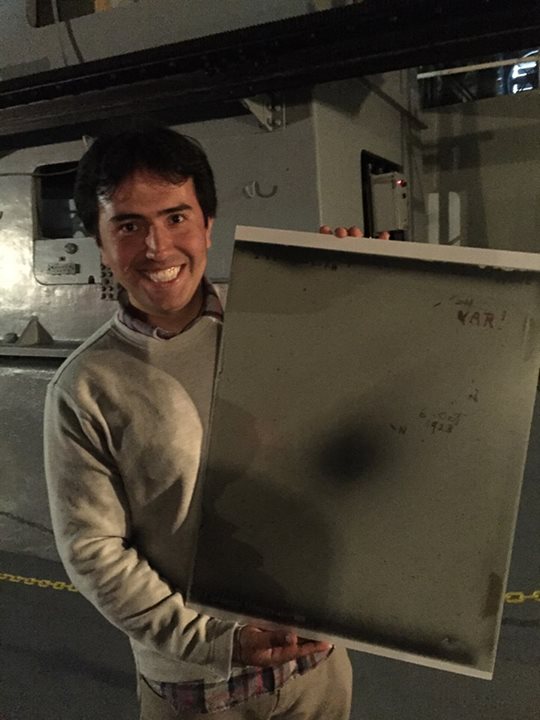Andrés started working for DES as an undergraduate from the Universidad de los Andes (Bogotá, Colombia, where he was born) at Fermilab during the Summer of 2006, helping in the characterization and testing of the detectors of the Dark Energy Camera (“Charged-Coupled Devices”, or CCDs). He returned to Fermilab the next two Summers, but this time as a graduate student from the University of Pennsylvania (Penn). At Penn, he also started to get involved in the weak lensing (WL) working group of DES, helping in the development and testing of the code that we use to measure the subtle distortions of galaxy shapes caused by lensing. WL is a powerful technique to know about dark energy and dark matter (and as such it is a central technique used in DES), but it is subject to numerous sources of errors that can easily mask or mimmic that subtle signal. Andrés has worked on the understanding of some of these errors to quantify the way they can bias astronomical measurements. He continued with his work on lensing and detectors as a postdoc at Brookhaven National Laboratory. Now at JPL, while still working on DES, he and his colleagues make sure that the sensors of future projects such as the Large Synoptic Survey Telescope (LSST) and NASA’s WFIRST mission will be accurate enough to use weak gravitational lensing as a probe of dark energy and the history of the Universe.
We asked Andrés a few more questions – here’s what he had to say:
What is your favorite part about being a scientist?
I love the fact that it is a job that constantly challenges me to learn new things. I am a very curious person, so I am happy any time I need to learn and master a new topic. I also get to work and discuss ideas with very smart and talented people, from whom I am constantly learning. And I get to think about exciting topics such as the origin and history of the Universe.
When did you know you wanted to be a scientist?
I’ve always liked math and science, but it was not until I was in college that I decided to be a scientist. In fact, I originally started college as an Industrial Engineering major. But then, during the first semester, I was truly inspired by a class called “Great Ideas in Physics”, which made me realize that I wanted to study Physics and try to decipher the secrets of Nature.
What motivates / inspires you?
I find motivation in the important people in my life (my family, my girlfriend, and my friends). I also find motivation in learning new things everyday, and knowing that the work we do contributes at least a little bit in the understanding of fundamental questions about our world.
Do you have any hobbies or play any sports?
I love football (soccer)! It is a big sport in Colombia, so I have been practicing it since I was a kid. When I can, I play 3 or 4 times a week. I also enjoy learning other languages. I have studied French and I’m currently taking Japanese lessons once a week. During my free time, I like watching and reading Japanese animation and comics (“anime” and “manga”, respectively), and playing video games. I also like to listen to symphonic and power metal very much, so I attend concerts of my favorite bands when possible.
What is your favorite space-related image, and why?
One of my sources of inspiration is the picture of the “Pale Blue Dot”, a picture of the Earth taken by the Voyager 1 at about 6 billion kilometers from us. Carl Sagan eloquently gave a touching speech based on that picture. It helps me put things in perspective, see the big picture, and to reflect about our place in the Universe.
What is your favorite book, movie, and/or TV show?
I really like the Magic Realism of “One Hundred Years of Solitude”, and as a Colombian I feel identified with it. Another good book is “Labyrinths”, a collection of stories by Jorge Luis Borges. He usually toys with ideas from physics and math (such as the concept of infinity) and turns them into fantastic narrations.
I like the movies from Hayao Miyazaki and Studio Ghibli, such as “Spirited Away” and “Princess Mononoke”. About TV shows, there are many I like. Some of them are: Cosmos, The Simpsons, The X Files, Game of Thrones, The Walking Dead, Cowboy BeBop, and Neon Genesis Evangelion.
If you weren’t a scientist, what would your dream job be?
I would have loved to be a musician. I would have also liked to study linguistics, philosophy, or history.
